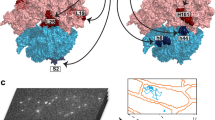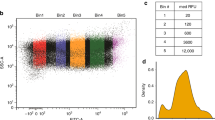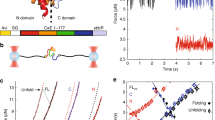Abstract
SYNTHESIS of proteins from the mRNA in eukaryotic cells differs from prokaryotes in two important ways. In the mammalian cell, the translation of mRNA in the cytoplasm is remote from the transcription in the nucleus, whereas in bacteria these two processes occur almost simultaneously1,2. Bacterial protein synthesis ceases within several minutes of inhibition of RNA transcription with actinomycin3; hence, the mRNA is short-lived. In metazoan eukaryotic cells, a similar experiment indicates that protein synthesis is not immediately affected by inhibition of transcription. Thus the mRNA is much more stable—of the order of several hours4. In a few specialized systems, the lifetime of mRNA can be deduced by observing the decay of protein synthesis after RNA synthesis has ceased. The messenger for haemoglobin in the reticulocyte5 and for silk fibroin in the silkworm6 are examples of stable messenger molecules with a lifetime of several days. The measurement of messenger lifetime in cells with active RNA metabolism is more difficult. In the experimental approach mentioned above, new RNA synthesis was blocked with actinomycin and the subsequent decay of protein synthesis measured. Under these conditions, protein synthesis generally decreased with a 2.5 to 3 h half-life in a wide variety of systems4,7–9. Interpreting the decay of protein synthesis as due to a concomitant degradation of mRNA assumes that the availability of messenger molecules is limiting in protein synthesis. Here, we shall show that mRNA decay is not responsible for protein synthesis decay in actinomycin. Rather, mRNA appears quite stable after the administration of actinomycin. The subsequent decay of protein synthesis appears to be due to a failure in the initiation of translation.
This is a preview of subscription content, access via your institution
Access options
Subscribe to this journal
Receive 51 print issues and online access
$199.00 per year
only $3.90 per issue
Buy this article
- Purchase on Springer Link
- Instant access to full article PDF
Prices may be subject to local taxes which are calculated during checkout
Similar content being viewed by others
References
Byrne, R., Levin, J. G., Bladen, H. A., and Nirenberg, M. W., Proc. US Nat. Acad. Sci., 52, 140 (1964).
Miller, jun., O. L., Beatty, B. B., Hamkalo, B. A., and Thomas, jun., C. A., Cold Spring Harbor Symp. Quant. Biol., 35, 505 (1970).
Levinthal, C., Keynan, A., and Higa, A., Proc. US Nat. Acad. Sci., 48, 1631 (1962).
Penman, S., Scherrer, K., Becker, Y., and Darnell, J. E., Proc. US Nat. Acad. Sci., 49, 654 (1963).
Rifkind, R. A., Danon, D., and Marks, P. A., J. Cell Biol., 22, 599 (1964).
Suzuki, Y., and Brown, D. D., J. Mol. Biol., 63, 409 (1972).
Staehelin, T., Wettstein, F. O., and Noll, H., Science, 140, 180 (1963).
Cheevers, W. P., and Sheinin, R., Biochim. Biophys. Acta, 204, 449 (1970).
Craig, N., Kelley, D., and Perry, R., Biochim. Biophys. Acta, 246, 493 (1971).
Godchaux, W., Adamson, S. O., and Herbert, E., J. Mol. Biol., 27, 57 (1967).
Fan, H., and Penman, S., J. Mol. Biol., 50, 655 (1970).
Lodish, H., J. Biol. Chem., 246, 7131 (1971).
Edmonds, M., Vaughan, jun., M. H., and Nakagato, H., Proc. US Nat. Acad. Sci., 68, 1336 (1971).
Darnell, jun., J. E., Wall, R., and Tushinski, R. J., Proc. US Nat. Acad. Sci., 68, 1321 (1971).
Lee, S. Y., Mendecki, J., and Brawerman, G., Proc. US Nat. Acad. Sci., 68, 1331 (1971).
Sheldon, R., Jorale, C., and Kates, J., Proc. US Nat. Acad. Sci., 69, 417 (1972).
Roberts, W. K., and Newman, J., J. Mol. Biol., 20, 63 (1966).
Perry, R. P., Exp. Cell. Res., 29, 400 (1963).
Penman, S., Vesco, C., and Penman, M.,, J. Mol. Biol., 34, 49 (1968).
Penman, S., Rosbash, M., and Penman, M., Proc. US Nat. Acad. Sci., 67, 1878 (1970).
Joklik, W., and Becker, Y., J. Mol. Biol., 13, 496 (1965).
Columbo, B., Vesco, C., and Baslioni, C., Proc. US Nat. Acad. Sci., 53, 1437 (1968).
Stewart, J. A., and Papaconstantinou, J., J. Mol. Biol., 29, 357 (1967).
Wilson, S. H., and Hoagland, M. B., Biochem. J., 103, 567 (1967).
McAuslan, B. R., Virology, 21, 383 (1963).
Penman, S., J. Mol. Biol., 17, 117 (1966).
Eagle, H., Science, 130, 432 (1959).
Author information
Authors and Affiliations
Rights and permissions
About this article
Cite this article
SINGER, R., PENMAN, S. Biological Sciences: Stability of HeLa Cell mRNA in Actinomycin. Nature 240, 100–102 (1972). https://doi.org/10.1038/240100a0
Received:
Revised:
Issue Date:
DOI: https://doi.org/10.1038/240100a0
This article is cited by
-
Stability of polyadenylated mRNA in pig lymphocytes
Bioscience Reports (1981)
-
Effects of actinomycin D on ribosomal RNA and protein synthesis as revealed by high resolution autoradiography
Virchows Archiv B Cell Pathology Including Molecular Pathology (1979)
-
Individual messenger RNA half lives in Saccharomyces cerevisiae
Molecular and General Genetics MGG (1979)
-
The mechanism by which actinomycin D inhibits protein synthesis in animal cells
Nature (1977)
Comments
By submitting a comment you agree to abide by our Terms and Community Guidelines. If you find something abusive or that does not comply with our terms or guidelines please flag it as inappropriate.



